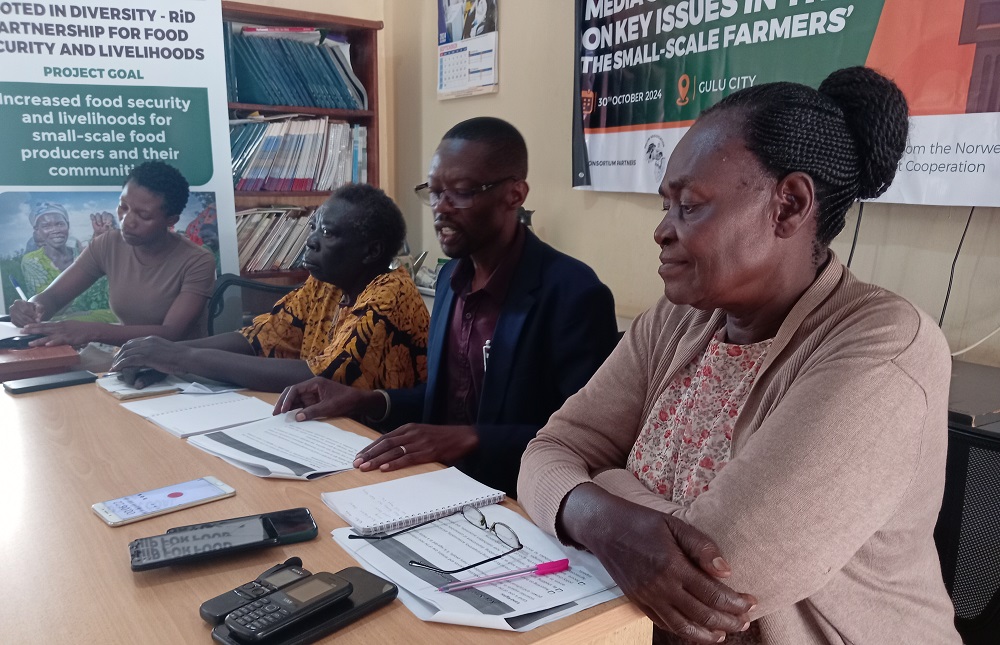Gulu, (UG):– The small-scale farmers in Northern Uganda have called upon journalists in the region to pick interest in agricultural reporting with a special lens focusing on the plight of small-scale farmers in the sector.
Speaking to DailyExpress in an interview earlier this week at the National Organic Week annual campaign organized by Eastern and Southern Small-scale Farmers’ Forum (ESAFF) Uganda, Mr Nyeko Ronald Reagan, a small older farmer in Amuru district, says they are bogged down with real-time challenges of access policies, inputs to climate-induced challenges.
“We are facing limited access to quality seeds, intellectual property rights, patent laws, and counterfeited seeds in the markets and these are some of the issues we expect journalists to voice out,” Mr. Nyeko said.
Amidst the challenges, Mr. Nyeko, “calls upon the media to popularize various models like Community Managed Seed Security model (CMSS),” a localized initiative small-scale farmers have embarked on with the support from ESAFF Uganda to promote the protection of seed security and sovereignty.
He says using the CMSS initiative; to improve agricultural productivity and seed sovereignty of small-scale farmers through increased access to affordable good quality.
According to Mr Nyeko, the media should help to voice their struggle to promote food sovereignty, support sustainable agriculture, preserve biodiversity, and ensure seed accessibility which will in turn leverage community empowerment.
At ESAFF Uganda, several campaigns are being implemented using local and national initiatives such as community seed banks, farmer field schools approach, Agroecology school clubs, and rigorous engagement of stakeholders on finding suitable seed policies, regulations, and national gene bank.
Julius Ocungi, the Bureau Chief of Uganda Radio Network in West Acholi, and an alumnus of the Agroecology School for Journalists and Communicators, agreed to the call. “It is true, that we have an important role as journalists.”
“Not all journalists know the beat but I implore my colleagues to consider understanding and reporting the issue affecting stallholder farmers especially their struggle for seed sovereignty, it is very crucial,” he said.
According to Mr Ocungi, the influence of multinational companies importing agro inputs and financing agricultural programs in Uganda tends to be huge and overshadow the effort of small-scale farmers with a “genuine case to protect detrimental impact on the food system.”
“Because these large, powerful enterprises can afford to pay for media coverage, journalists focus more on multinational agro-input firms than small-scale farmers,” the URN journalist added.
Ranging from the seeds, land rights and use, market, postharvest handling, and transportation to climate-induced challenges affecting small-scale farmers, Ms Kalinaki Naume, the Project Officer, Livelihood and Business at ESAFF Uganda, said they are working with smallholder farmers to find solutions to some of their problems and implored journalists to bridge the gap through informing the community.
“It is the time for journalists to pay attention to issues affecting seed, food sovereignty, and land rights because we don’t want to reach a situation where journalists only rush to report about the negative (blown out) issues like famine, people killed in land wrangles and yet they can minimize it by informing and educating the public,” says Ms Naume.
Among some of the strategies ESAFF Uganda is embarking on, the Project Officer-Livelihood and Business, says they are training farmers to use available resources to produce organic manure, and pesticides to achieve food sovereignty in the face of climate change.
In the concept of promoting community seed banks, ESAFF Uganda is giving community led-farmers groups in the districts of Adjumani, Omoro, Apac, and Amuria; the right to decide, define their food system on how they can produce, store, and sell, something she says, farmers have been denied. This strategy is to save farmers from the financial burden of buying seeds with uncertainty in every planting season.
However, Okot Lil Romeo, an alumnus of the Agroecology School for Journalists and Communicators, argues that to spread the message on locally tailored solutions ESAFF Uganda and the farmers are implementing in communities, the development partner should intentionally scale it up to a wider audience were policies and actions decided.
“They (small-scale farmers) cannot afford TV/Radio talk shows. Even buying space in the newspapers, they don’t have the money. Also, most media houses do not have a budget to facilitate their reporters to reach farmers in remote areas. So, development partners should rethink how to make the campaign widespread”
According to the Food and Agriculture Organisation (FAO), 2023 report, of the 70% of Ugandans employed in agriculture, up to 3.5million operate family farms as small-scale farmers and are categorized as the poorest in the world suffer from hunger and 37.5% of them live below the poverty line of 1.25dollars per day.
Do you have a story or an opinion to share? Email us on: [email protected] Or join the Daily Express WhatsApp channel for all the latest news and trends or join the Telegram Channel for the latest updates.

